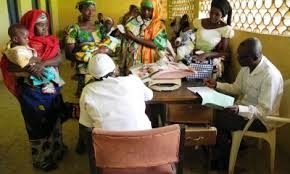A cross-section of the affected mothers, who spoke in separate interviews with the News Agency of Nigeria (NAN) in Miri community of Bauchi, said their husbands were not providing necessary support to enable them to take their sick children to designated treatment centres.
They said the trend was inimical to effective treatment of malnourished children in the state.
Malnutrition, according to the World Health Organisation (WHO), refers to deficiencies or excesses in nutrient intake, imbalance of essential nutrients or impaired nutrient utilisation.
The double burden of malnutrition consists of both undernutrition and overweight and obesity, as well as diet-related noncommunicable diseases.
Undernutrition manifests in four broad forms: wasting, stunting, underweight, and micronutrient deficiencies.
A nutrition and health survey by the United Nations Children’s Fund (UNICEF), showed that Nigeria has the second highest burden of stunted children in the world, with a national prevalence rate of 32 per cent of children under five.
The UN Agency estimated that about two million children suffer from severe acute malnutrition (SAM) in the country, with only two out of every 10 children affected is currently reached with treatment while seven per cent of women of childbearing age also suffer from acute malnutrition.
It indicated that exclusive breastfeeding rates have not improved over the past decade, with only 17 per cent of babies being exclusively breastfed during their first six months of life. And 18 per cent of children aged 6-23 months are fed the minimum acceptable diet.
The fact sheet indicated that states in northern Nigeria are the most affected by the two forms of malnutrition – stunting and wasting.
It said that high rates of malnutrition pose significant public health and development challenges in the country.
According to it, stunting, in addition to an increased risk of death, is also linked to poor cognitive development, low performance in education and productivity in adulthood – all contributing to economic losses estimated to account for as much as 11 per cent of Gross Domestic Product (GDP).
In Bauchi State just as in the case of other states in the region, 48.5 per cent of children under five are underweight, according to the National Nutrition and Health Survey (NNHS) 2018, and Global Nutrition Report 2021.
The report also showed that 64.9 per cent children under five are stunted, 7.6 per cent wasted and 13.2 per net of children are born with low weight in the state.
Mrs Aisha Shehu, a nursing mother, said it was difficult for her to get to the Community-Based Management for Acute Malnutrition (CMAM) centre due to lack of money for transportation.
“Mothers need money for transportation between their homes and treatment centres.
“I sold my goats and saved the money from the proceed of the sale for transportation.
“This enable me to take my child to the centre. I spent N2,000 on transportation every clinic day,” “she said.
Mrs Liatu Mohammed, a mother of two, said that her husband referred her to her parents to treat their malnourished children.
“He sent me to my parents; this child has presented similar symptoms like her siblings who died from complications.
“My parents are providing transport fare and other medical expenses,” she said.
Recounting her ordeal, Zainab Idris said that she could not access free Ready to Use Therapeutic Food (RUTF) for her sick baby at the centre.
“My six-month old baby had been diagnosed with acute malnutrition, and the centre has run out of stock of the food supplements.
“I presented my baby for routine immunisation but diagnosed with malnutrition but then there was no RUTF,” she said.
However, Rashida Ibrahim said her child was treated for various ailments before being referred to CMAM center.
She said that the child was being provided with 20 sachets of RUTF weekly for malnutrition treatment.
Mr Nasiru Ya’u, Chairman, Association of non-formal Quranic School Teachers, said that religious leaders would conduct community sensitisation activities to create awareness on malnutrition, maternal, and child health issues.
He said the exercise was also designed to encourage husbands to support women towards improving their health status.
For his part, Dr Rilwanu Mohammed, Chairman, Bauchi State Primary Healthcare Development Agency said that UNICEF supplied 500 cartons of RUTF distributed to 21CMAM centers across the state.
The gesture, he said, would enhance treatment and case management of malnutrition in the state.

















Discussion about this post